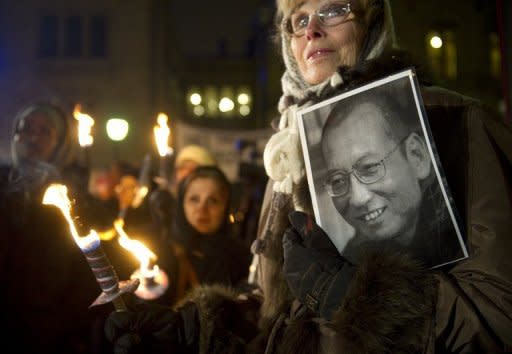China still fuming over Liu's Nobel prize
Six months after the Nobel Peace Prize was awarded to Chinese dissident Liu Xiaobo, Norway is still feeling Beijing's fury, though a series of retaliatory moves has largely spared flourishing bilateral trade. In December, China blocked Liu from attending the prize ceremony in the Norwegian capital Oslo, where an empty chair on the podium marked his absence. Liu, a former professor who was at the forefront of the 1989 Tiananmen Square protests, was jailed in December 2009 for 11 years on subversion charges after co-authoring Charter 08, a manifesto that spread quickly on the Internet calling for political reform and greater rights in China. When the announcement of Liu's choice was made last October 8, Chinese authorities, who regard him as a "criminal", warned that the move would "harm ties" between China and Norway. And they kept their word. Since then, there has been no high-level contact between the two countries, with experts here speaking of "an icy climate". Beijing has thus cancelled a series of planned meetings and visits in both the political and cultural fields. But Norwegian foreign ministry officials are taking it all in their stride, hoping that Beijing's wrath will ultimately dissipate. "The political dialogue has been at a minimum since the Nobel award at China's initiative," spokesman Kjetil Elsebutangen said. "On the Norwegian side, we favour broad cooperation and that's in the interest of both countries." Oslo has repeatedly pointed out that the Nobel Committee which awards the Peace Prize is an independent body, even though its five members are appointed by the Norwegian parliament as stipulated by Alfred Nobel in his testament setting up the various prizes. But the Chinese have not been placated. "It is difficult to maintain friendly relations with Norway as in the past," Chinese foreign ministry spokesman Jiang Yu said in December. But when it comes to economic ties, Beijing's ire has been tempered with a healthy dose of pragmatism. Indeed official Norwegian statistics show that trade ties with the world's second largest economic power are continuing to grow. In January, a month after the Nobel peace award ceremony, state-controlled China National BlueStar, a global leader in synthetic materials, bought Norwegian silicon firm Elkem for $2.0 billion (1.5 billion euros). "It's not exactly business as usual but it is neither the feared boycott," said Espen Soeylen, a top official of the Norwegian employers group NHO. But the Chinese backlash is still being felt. Beijing indefinitely postponed negotiations on a bilateral free trade deal, which would have made Norway the first European country to seal such an accord with the Chinese. "We believed and we hoped that the agreement would be signed in 2011," said Soeylen. Chinese authorities have also symbolically toughened veterinary controls on imports of Norwegian salmon. "The tougher controls means that fresh salmon remains stuck in warehouses for days until past the expiration date," said Christian Chramer, a spokesman for the Centre for Norwegian Seafood Products. In volume, sales of Norwegian salmon to China dropped 12 percent during the first quarter of this year compared with the same period in 2010. "Demand for salmon is at a historically high level worldwide and some breeders prefer to export to other markets rather than letting their stocks rot in warehouses," Chramer noted. Norway's Statoil is also facing hurdles as it vies to extract gas from Chinese shale reserves, while certification agency Det Norske Veritas has lost its licences to operate in China.





